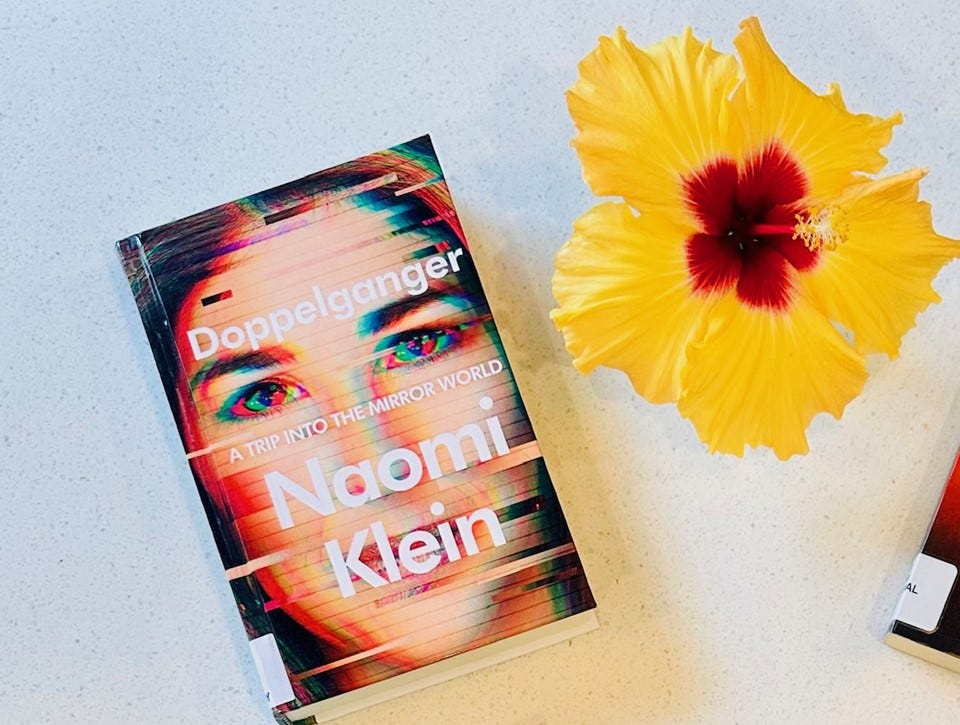Unmasking Identity: Naomi Klein's Doppelgänger
I haven’t reviewed any non-fiction recently – mainly because I haven’t actually been reading too much of it. However, this week we take a look at the inaugural Women’s Prize for Non-Fiction winner, Doppelgänger: A Trip into the Mirror World by Naomi Klein.
Non-fiction may not be everyone’s cup of tea, but I particularly loved this book because it really challenged my thinking. I found myself discussing it in many work meetings, often starting conversations with “So, I’ve read this book…” There were so many key messages in Doppelgänger that I could apply to my work, and perhaps you might find it relevant too.
Let’s get into it!
Doppelgänger delves into the unsettling reality of identity theft and conspiracy theories in the digital age. Klein explores how the rise of social media and digital technology has created a landscape where our identities can be manipulated, duplicated, and distorted in ways previously unimaginable.
The narrative is anchored around Klein's personal experience with her own doppelgänger—Naomi Wolf, whom people mistook Klein for, especially during the COVID lockdowns. Wolf is a vocal figure in alt-right circles, whereas Klein is known for her incisive critiques of capitalism and globalisation. This mirror image forces Klein to confront the broader implications of identity confusion and the erosion of trust in public discourse. Through this lens, she examines the cultural and political forces that give rise to such phenomena, including the spread of misinformation, the fragmentation of reality, and the deepening of societal divides. There’s also commentary on how we create doppelgängers of ourselves through online personas, social media, and avatars.
Klein's narrative is both introspective and investigative. She weaves her personal story and experiences with larger socio-political dynamics, providing us with a compelling, multi-faceted perspective on how identity and ideology are manipulated in the digital age. Her writing is thought-provoking and relevant to everyone who uses and engages with social media. Doppelgänger is not just a critique but also a call to action, encouraging more discerning and critical engagement with the information we consume.

The points that really stood out for me, and which I am reflecting on for my work life, are around movement building and changemaking. Klein emphasises the importance of authenticity, solidarity, and resilience in the face of misinformation and ideological manipulation. She highlights how digital platforms, while powerful tools for organising and activism, can also fracture movements by spreading divisive narratives and falsehoods. Klein calls for a renewed commitment to fact-based advocacy and collective action, urging activists to build movements grounded in shared values and mutual trust.
Klein's exploration of her doppelgänger experience underscores the need for vigilance against co-optation and misrepresentation, advocating for a clear and unified message to counteract the confusion sown by disinformation. By fostering genuine connections and prioritising inclusivity, movements can navigate the challenges of the "mirror world" and effect meaningful change. Klein's work serves as a reminder that while the digital age presents unique obstacles, it also offers unprecedented opportunities for grassroots mobilisation and transformative action.
While this book is quite confronting at times, it ultimately finishes with messages of hope. I had to write this down: change doesn’t happen without collaboration, and everything worthwhile is done with others.
Congratulations to Naomi Klein on winning the inaugural Women’s Prize for Non-Fiction, and thank you for this book. I thought it was a real gift. Add this to your TBR list, because life is too short to read bad books.



